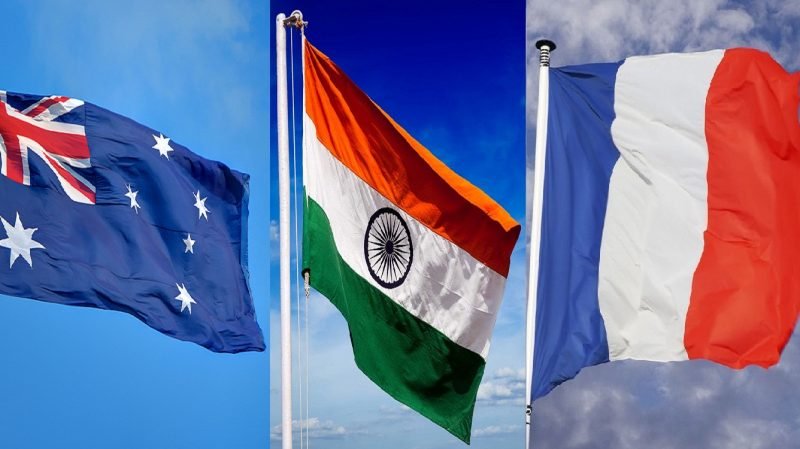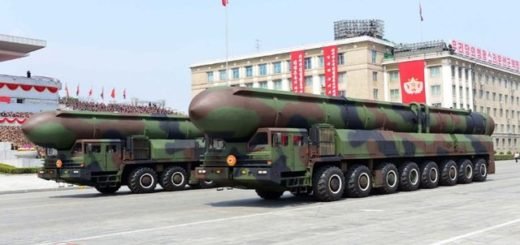A Transcontinental trilateral in the Indo-Pacific: Assessing the potential of the India-Australia-France Trilateral

Introduction
2020 can well be the year when the concept of Indo-Pacific finally comes of age. Pandemic apart, it has been an eventful year for the Indo-Pacific region. What was beset with ambiguities until a few years ago, is now giving way to concrete policy formulations from states both within and outside the region. Most recently, Berlin launched the Policy Guidelines for the Indo-Pacific region outlining its vision for enhanced engagement with this vast region while recognising the significance of the region for its export-driven economy. There is news of Netherlands soon releasing its own version of the Indo-Pacific policy document, and European Union is also touted to be finalising its exclusive agenda for the region.
Latest in this list of concrete policy outcomes concerning the Indo-Pacific agenda is the First Senior Officials’ India-France-Australia Trilateral Dialogue. This transcontinental trilateral dialogue, first espoused by strategists and later announced by the French PM Emmanuel Macron during his 2018 visit to India, is a welcome move that may help align cooperation in various matters amongst the three democracies as well as within the region, towards shared goals.

Tracing the convergences
The Ministry of External Affairs, India’s press release of the “outcome-oriented” meeting notes of cooperation on “Maritime Global Commons and practical cooperation at the trilateral and regional level, through regional organisations such as ASEAN, IORA, and IOC”. This is suggestive of the emphasis on collaborative use of the existing multilateral constructs that have been so firmly embedded in the region, albeit with relative success. However, at the moment, together, Australia, France and India don’t find themselves to be equal members of any of these three organisations mentioned. For instance, Australia and India are dialogue partners in ASEAN, whereas France is not. Australia and India are members while France is a dialogue partner in IORA. In the same vein, just recently in March 2020, India was accepted as an observer in the Indian Ocean Commission, where France is present through La Réunion. It is only in the Indian Ocean Naval Symposium (IONS) which isn’t a multilateral organisation but a forum for maritime cooperation, that all the three states are represented as members. This trilateral dialogue hence can be a bridge between the countries to facilitate discussions on issues of mutual interest that can then be put forth by the respective countries in the multilateral forums, until unless all of them find seats at the high tables of ASEAN led or ASEAN independent organisations of the region.

Geographical limitations
It would be far-fetched to expect that all the three nations to have a mutual consensus on what constitute the geographical limits of the Indo-Pacific, but currently India and France’s conception of the Indo-Pacific is identical and also broader than Australia’s conception of the same. In this regard, it remains to be seen how the three countries will shape practical policies, going forward. However, notwithstanding the differences, the cooperation in the maritime domain in helping shape an Indian Ocean maritime security order should be the focus. To begin with, the entire maritime security apparatus (Navy, Coast Guard and the Maritime bureaucracy) of all the three nations have been each other’s trustworthy partners. Hence it is oft suggested that the three countries can gainfully collaborate in enhancing the Maritime Domain Awareness (MDA). As the first step, both Australia and France have agreed to post their liaison officers in the IFC-IOR in Gurugram, India. French Navy and its maritime agencies’ active role in addressing blue crimes through its involvement in the European Union’s Critical Maritime Routes Programme (EU CRIMARIO I) cannot be missed. Now when the EU CRIMARIO II plans to diversify into the Eastern Indian Ocean, India and Australia can become credible partners in the same.
Partnerships beyond the Indian Ocean
Another area of mutual interest where the countries can gainfully collaborate is in promoting sustainable development of the Pacific Island Nations. For Australia, these neighbouring island nations are vital for a host of reasons: cultural, historical and their strategic vulnerability to the ever growing Chinese presence. For France, its overseas territories in the region are a reason enough to be interested. Although Australia and France have permanent territorial interests in that region, India too has been courting these island nation though direct bilateral engagement and extending aid. Relatedly, India’s recently launched umbrella initiative termed the Indo-Pacific Oceans’ Initiative (IPOI) can well accommodate Australia and France’s expertise in capacity building and resource sharing with regards to a sustainable blue economy. India and France have already championed collaborations under the International Solar Alliance (ISA) located in Gurugram, India. There is enough room for trilateral partnerships on this front, in this part of the region.

Conclusion
What is unique about this trilateral is that although currently it is focused on soft security issues and benign collaborations, the realist would argue that strong bilateral strategic and military partnerships back this structure. However, on the back of an ever expansionist China flexing itself in the South China Sea and increasingly threatening the independence of the critical SLOCs, these “issue-based” mini-laterals and trilateral partnerships can go a long way in signalling the right message.


















